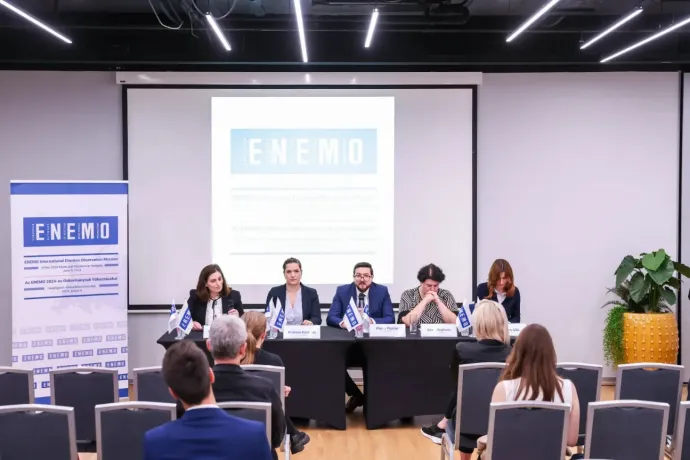International election observers call Alexandra Szentkirályi's pre-election withdrawal deceptive

The international mission of the European Network of Election Monitoring Organizations (ENEMO) presented its preliminary report on the 2024 Hungarian municipal elections. Pierre Peytier, the organization's representative pointed out that they observed all aspects of the electoral process, including the campaign, campaign financing, the media environment and, in several polling stations, the voting process itself.
According to the organization, the shortcomings in the current legal framework had a negative impact on the election and favored the governing party. Concerns were raised about inflammatory rhetoric, shadow financing, media bias and unequal opportunities for the participating parties, ENEMO said. The good news is that the administration of the election itself was efficient and professional.
Nino Rizhamadze, a member of the delegation said that the recently adopted law on the protection of sovereignty had, in their view, had a negative impact on the situation of the media and civil society, and added that the adoption of such a law six months before elections was unusual.
Kristina Kostelac, another member of the mission stated that ENEMO condemns the type of voter deception strategy whereby a candidate for mayor withdraws 48 hours before the election and asks their supporters to vote for a supposedly independent candidate, because this will have an impact on the election results (a reference to the withdrawal of Alexandra Szentkirályi, Fidesz's candidate for mayor).
Kostelac said the process of collecting the signatures was basically in order. However, the fact that there were 859 municipalities with only one candidate running for mayor was not good for pluralism and impeded the right to choose between different political options. She added that there were indications of unethical use of data, the use of public resources for campaign purposes and pressure from local authorities in numerous locations, and also expressed concern about the involvement of children in the campaign.
According to the observer, the rules on campaign financing are not in line with European standards: there are no legal restrictions on campaign spending in municipal campaigns, which puts candidates from smaller parties or independent candidates at a disadvantage. She mentioned, for example, the money spent on advertising by CÖF and Megafon as such a financial transparency problem.
Speaking on behalf of the organization, Ana Mihajlovic added that the redrawing of electoral boundaries six months before the elections was against international standards. They also encountered the leaking and selling of voters' personal data. In one Budapest district, for example, illegally registered (Venezuelan) voters could have influenced the election. This latter case is currently being investigated.
According to Mihajlovic, the confidential nature of the vote was respected during the elections, but in 9 percent of the cases there was more than one person in the polling booth during the observed voting. Moreover, 3 percent of voters were unable to vote secretly because of the location of the booth. From some locations, they received reports of vote buying and chain voting. In the latter case, a person brings out a blank ballot paper, which is filled in by the agent, and then the next bribed person takes it in and drops it in the ballot box, and the process continues. In the international observer's experience, the voting records were completed properly and the process was generally transparent and straightforward.
International observer Teodora Gilić said she was concerned about the low level of media pluralism. In ENEMO's assessment, the campaign was characterized by Fidesz-affiliated political actors' and government officials' discriminatory behavior towards independent media. In her opinion, political pressure was evident in both national and local media. The biased nature of the coverage was also demonstrated by the fact that several pro-government media were involved in the Fidesz campaign.
Gilić also said that she was concerned about the lack of legal regulation of social media, as it enables political parties to conduct extensive and unrestricted campaigns on social media. This also opens the door to abuse, inflammatory narratives, disinformation and unbalanced campaigning, and makes it possible to significantly influence the vote without any accountability whatsoever. Gilić said that the upsurge in pro-Russian narratives, and anti-EU narratives was also worrying.
We asked whether the observers had encountered anything in the Budapest election that would support mayoral candidate Dávid Vitézy's initiative to have the votes recounted. Pierre Peytier said that the recounts are well regulated in the Hungarian electoral system, but that they cannot answer the specific question at this time. However, their final report will cover this issue as well.
For more quick, accurate and impartial news from and about Hungary, subscribe to the Telex English newsletter!